Different Types Of Cooking Oils And Their Benefits

Content Source: https://www.healthkart.com/connect/different-types-of-cooking-oils-and-their-benefits/bid-4975
When it comes to selecting a cooking oil, there is no dearth of options. But the point here is, do all cooking oils are healthy? Or do they remain healthy after cooking?
Cooking is an integral part of every Indian kitchen and our mother’s put in a lot of effort in deciding what to cook for us, whether it lunch, dinner or breakfast. While selecting what to cook is an ongoing battle, there is one more battle that women often fight within when they go for grocery shopping, i.e. to decide which cooking oil is good and healthy for their family.
These days, the market is flourished with numerous cooking oil options, where some claim to be good for heart health, while some say that they are rich in Omega fatty acids. The confusion remains never ending. While it matters a lot whether the cooking oil you are choosing is healthy or not, another thing that is equally important is to identify whether the oil will remain healthy after being cooked or not?
When you are cooking your meal on high eat, you certainly don’t want your cooking oil to get oxidized or go rancid easily? When cooking oils go under oxidation they form free radicals after reacting with oxygen, which is basically harmful compounds not suitable for consuming. Thus, it becomes important to identify your cooking oil’s resistance to oxidation and rancidification both at low and high heat.
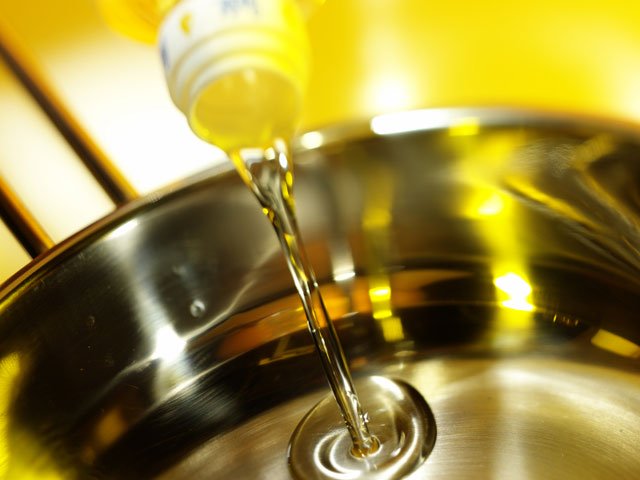
Image Source: www.thinkingmomsrevolution.com
To get more clarity on this, let’s discuss different types of cooking oils in detail.
Coconut Oil
Coconut oil is the undisputed winner when it comes to high heat cooking because close to 90% of the fatty acids present in coconut oil are saturated, which makes it highly resistant to heat and high temperature. Also, this oil remains semi-solid at room temperature and can last for even years without going rancid.
Some of the popular benefits of coconut oil include its rich of fatty acid called Lauric acid, which can lower your cholesterol and kills bacteria and other pathogens found in human body. Fats present in coconut oil also help in boosting metabolism and increase the feeling of fullness as compared to other cooking oil options.

Image Source: www.homegardenservices.com
Butter
Butter has been often demonized for its saturated fat content, but the reality is there is nothing to fear from real butter and it’s the processed margarine that you need to steer clear off.
Real butter is actually good for your healthy and is also fairly nutritious when used for cooking. It contains a good amount of Vitamins, Vitamin A , E, and K2 and is rich in fatty acids like Conjugated Linoleic Acid and Butyrate, both of them are known for their powerful health benefits.
Your regular butter contains tiny amounts of proteins and sugar, which tend to burn butter white cooking on high heat. If you want to avoid that, you can make clarified butter or ghee, a popular edible oil in Indian kitchens, at home so that there will be no traces of lactose and proteins and all your using is pure butterfat.
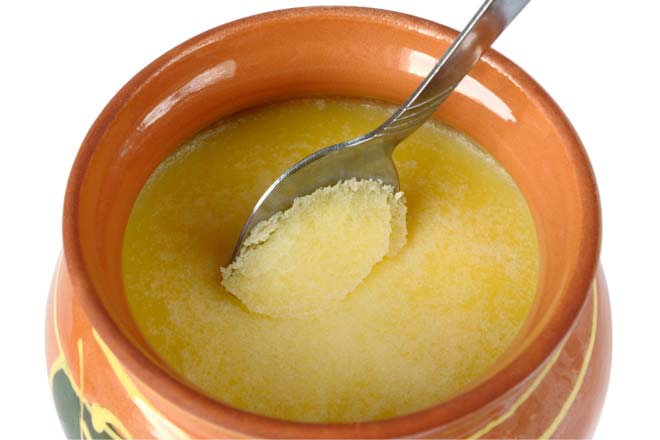
Image Source: www.diffen.com
Olive Oil
Olive oil has been often touted as the best cooking oil for its heart-healthy effects and is also one of the main reasons behind the many health benefits of Mediterranean diet. Olive oil also raises your HDL, the good cholesterol, and lowers the amount of LDL, the bad cholesterol, circulating in your blood stream. Several studies conducted on olive oil benefits have shown that, despite having fatty acids with double bonds, olive oil is good for cooking because of its resistance to heat.
However, it is important to opt for extra virgin olive oil only as it contains more nutrients and antioxidants than its refined forms. To prevent olive oil from going rancid, store it in a cool, dry and dark place.

Image Source: www.naturallycurly.com
Palm Oil
As the name suggest, palm oil is derived from the fruits of oil palms and is mostly rich in saturated and monounsaturated fats, with the very small amount of polyunsaturated fat present in it. All these factors make palm oil a good option for cooking. Red palm oil, the unrefined form of palm oil, is considered to be the best option as it is rich in Vitamin E, Coenzyme Q10, and other nutrients.
Flax Seeds Oil
Flaxseed oil contains a lot of Omega-3 and Alpha Linolenic Acid (ALA) and many people have been using this oil as a supplement to meet their Omega-3 fats requirements.
However, evidence has shown that the human body is not efficient enough to convert ALA to the active forms like EPA and DHA, which can be found in plenty in Fish Oil. Also, because the flaxseed oil contains a lot of polyunsaturated fats, one should not use it for cooking purpose.
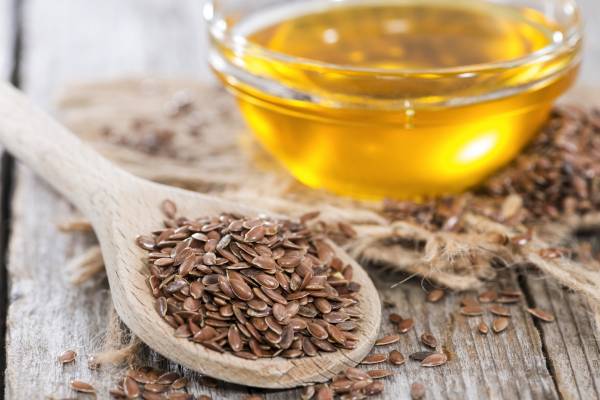
Image Source: www.breakingmuscle.com
Canola Oil
Canola oil is derived from rapeseeds after removing erucic acid, which is a bitter toxic substance found in rapeseeds.
The fatty acid breakdown of Canola oil is fairly good as it contains most of the monounsaturated fatty acids and also contains Omega-6 and Omega-3 in 2:1 ratio, which makes it fit for cooking.
Peanut Oil
There are a variety of nut oils available in the market which tastes awesome, but their rich polyunsaturated fats content makes them unfit for cooking. Such nut oils can be used as a part of some recipes but should not be actively used for frying or high heat cooking.
The same goes for peanut oil as well, even though peanuts fall under legumes category their oil composition is same as that of nuts oil.
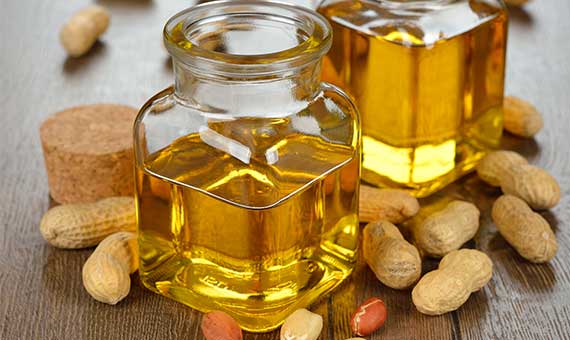
Image Source: www.newhealthadvisor.com
Vegetable Oils
This is one of the most common variants used in Indian kitchens. The industrial seed and vegetable oils are highly processed with rich Omega-6 fatty acids content. These oils are not at all fit for cooking and one should avoid them altogether. These oils are also often advertised to be ‘heart healthy’, which is not true, instead such oils can lead to some serious diseases like heart problems and even cancer.
Cooking oils that you should avoid include:
- Soybean Oil
- Corn Oil
- Cottonseed Oil
- Canola Oil
- Rapeseed Oil
- Sunflower Oil
- Sesame Oil
- Grapeseed Oil
- Safflower Oil
- Rice Bran Oil
A study conducted in U.S. Market has discovered that most of the cooking oils easily available in departmental stores contain between 0.56 to 4.2% trans fats, which are highly toxic.
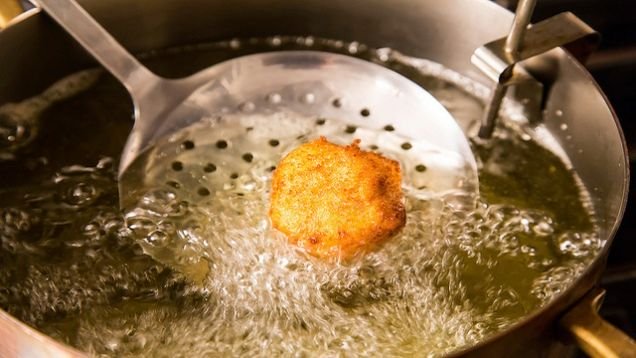
Image Source: www.lifehacker.com
How To Preserve Your Cooking Oil
To ensure that your cooking oils and fats do not rancid, it is important to consider certain factors,that include:
- Do not buy cooking oils in large batches, instead buy a small one, which you will use before they get expired.
- Store oils like olive, palm, and avocado, which are rich in unsaturated fats, in a dark, cool and dry environment so that they are less likely to oxidize or go rancid.
- Heat, oxygen, and light are the main reasons behind the oxidative damage of cooking oils.
- Make sure the lid of your cooking oil jar or can is tightly screwed after use.
Comments
No feedback Available






Leave a Reply
No feedback Available